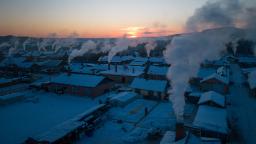China’s northernmost city just saw its coldest day ever


(CNN) — Temperatures in China’s northernmost city plunged to minus 53°C (minus 63.4 degrees Fahrenheit) — its coldest ever recorded, meteorologists said.
China’s meteorological authority has forecast big temperature drops in parts of the country and issued a blue cold wave on Monday.
Winters in Mohe are long and begin in early October, often lasting until May. Average temperatures during this period have been known to dip below freezing, experts said.
In 2018, rare “ice fog” — a weather phenomenon that occurs only in extreme cold climates when water droplets in air remain in liquid form — gripped residents, prompting local authorities to issue the city’s first-ever red warning for cold weather.
No alerts have been issued in Mohe yet but local meteorologists say the cold snap would continue into this week. Ice fog is also expected, they said.
Climate change has worsened the frequency and intensity of extreme weather events.
In the southwestern province of Sichuan, home to 80 million people, electricity cuts shut factories and plunged homes and offices into rolling blackouts — also killing thousands of poultry and fish at farms.








